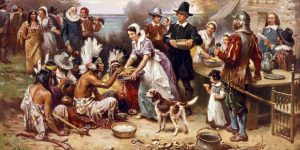2021 marks the 400th anniversary of a special American tradition. Four centuries ago, during the fall of 1621, the Pilgrims sat down with their new Native American friends and celebrated the first Thanksgiving in Plymouth, Massachusetts.
What a great tradition – where we gather together to recount the Lord’s blessings. I love the statement from columnist Mark Steyn: “Speaking as a misfit unassimilated foreigner, I think of Thanksgiving as the most American of holidays.” Consider its history as a holiday.
Pilgrims
The Pilgrims were one particular congregation that was born in the Midlands of England, in the sleepy village of Scrooby, about 150 miles north of London. The Pilgrims, a very small subset of Puritans (working for the “purity” of the Church of England), were Separatists. They thought reform within the Church was hopeless, so they worshiped Jesus in ways illegal at the time. That is — reading the Bible for themselves, having sermons and worship led by those not officially ordained in the Church, etc.
They were persecuted severely, so they fled to Holland and eventually sailed to America. Their goal was to settle in what they called “the northern parts of Virginia.” Hence, the voyage of the Mayflower in 1620, which they said was “for the glory of God and the advancement of the Christian faith” (Mayflower Compact, November 11, 1620).
Providentially, they were blown off course and were hindered from going south of Cape Cod. So they wrote up the Mayflower Compact, an agreement of self-government under God, which historians say was the step in the creation of the Declaration of Independence and the Constitution.
The first Thanksgiving
 Of course, our American tradition of Thanksgiving goes back to these hearty souls, who in 1621 celebrated a time of thanksgiving to God, despite all the problems they had seen. They invited the Indians, with whom they had made a treaty of peace (that lasted 53 years).
Of course, our American tradition of Thanksgiving goes back to these hearty souls, who in 1621 celebrated a time of thanksgiving to God, despite all the problems they had seen. They invited the Indians, with whom they had made a treaty of peace (that lasted 53 years).
The first description of the first Thanksgiving can be seen in a December 1621 letter from Pilgrim Edward Winslow, who wrote, “Our harvest being gotten in, our Governor sent four men on fowling, that so we might after a more special manner rejoice together, after we had gathered with a little help beside, served the Company almost a week. At which time, amongst other recreations, we exercised our arms, many of the Indians coming amongst the rest their greatest king, Massasoit with some 90 men, whom for three days we entertained and feasted. And they went out and killed five deer which they brought to the plantation and bestowed on our Governor and upon the Captain and others.”
A national holiday
Some people today don’t like the idea of Thanksgiving as a national holiday because it is inherently religious. Thanksgiving was indeed when the Pilgrims gave thanks to God.
While George Washington was the first president to declare a national day of Thanksgiving, President Lincoln was the first one to make Thanksgiving an annual holiday. (And during FDR’s days, Congress fixed the date as the 4th Thursday of each November.)
Some modern people today blame the Pilgrims for atrocities against the Native-Americans that followed at the hands of later European settlers and Americans – long after the Pilgrims. But in doing such things, these settlers were not at all following the Christian example of the Pilgrims.
Rev. Billy Falling, a Native-American pastor and author, told me: “The Pilgrims had good relationships with the Indians… As a Native-American, I thank God for the Europeans that brought us the Gospel and brought Western Civilization.”
As Americans, despite all our difficulties, we have much to be thankful for. And to think – we have enjoyed this tradition for 400 years.
Jerry Newcombe, D.Min., is the executive director of Providence Forum, an outreach of Coral Ridge Ministries Media (D. James Kennedy Ministries), where he also serves as senior producer (TV), columnist, and author.
For more articles by Jerry Newcombe, visit https://www.goodnewsfl.org/

Comments